2023年中考英语二轮复习 第九课时 动词的时态和语态课件(46张PPT)
文档属性
| 名称 | 2023年中考英语二轮复习 第九课时 动词的时态和语态课件(46张PPT) |

|
|
| 格式 | pptx | ||
| 文件大小 | 483.9KB | ||
| 资源类型 | 教案 | ||
| 版本资源 | 人教新目标(Go for it)版 | ||
| 科目 | 英语 | ||
| 更新时间 | 2023-05-24 00:00:00 | ||
图片预览

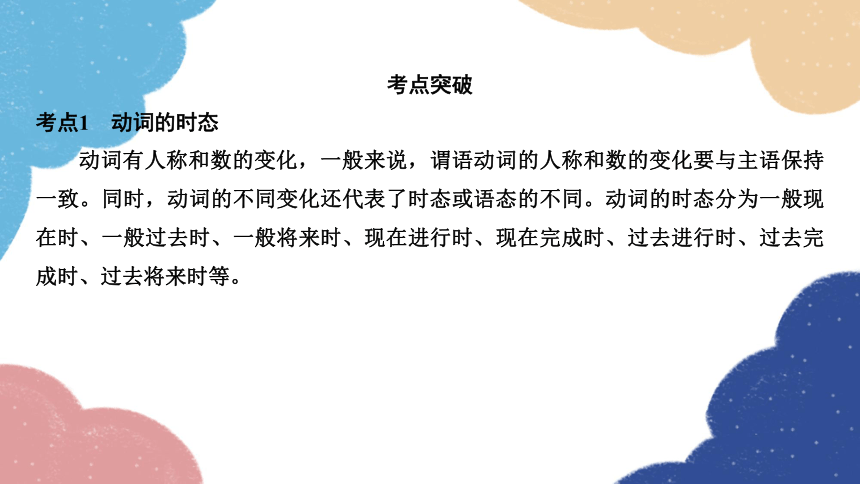
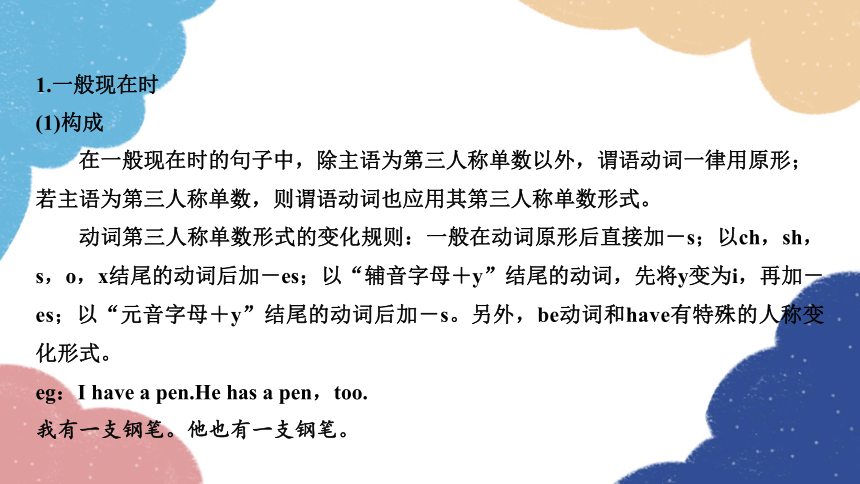
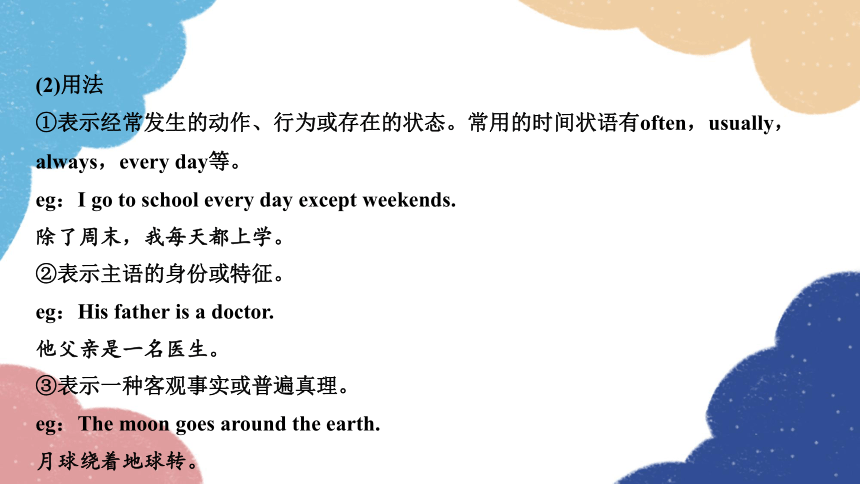
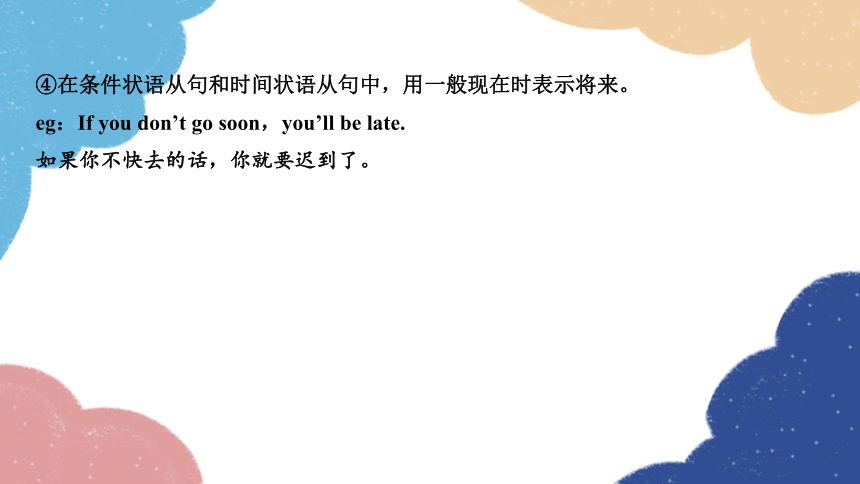
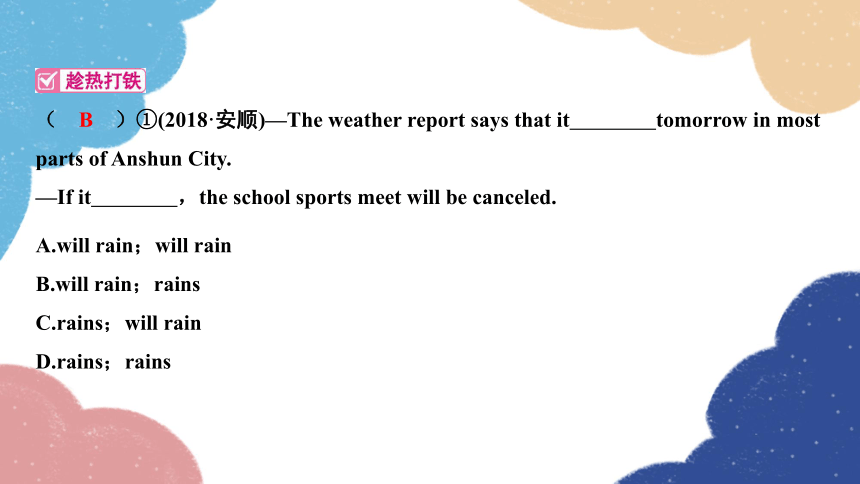
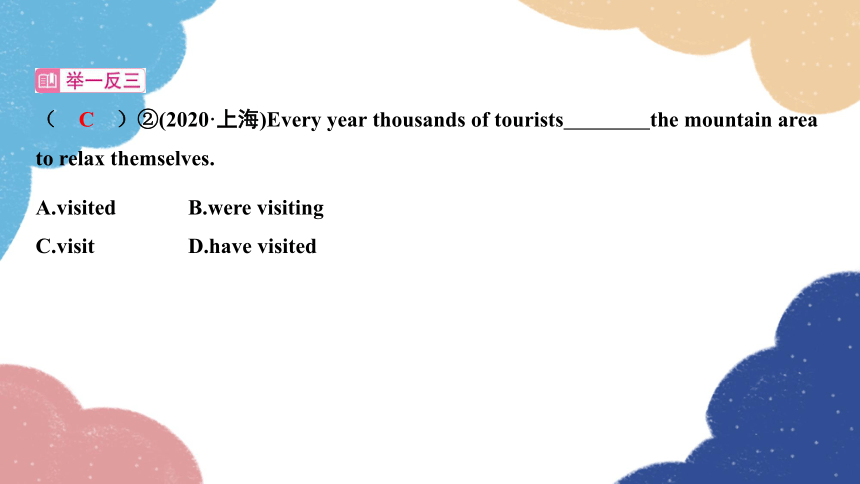

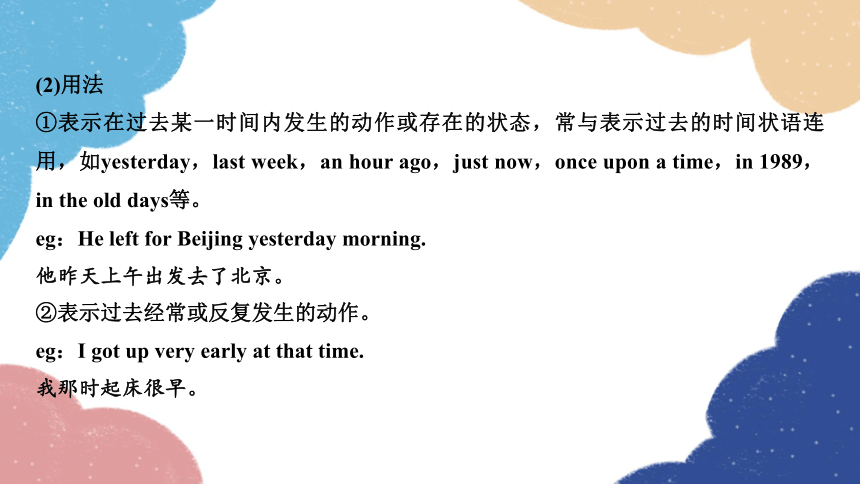


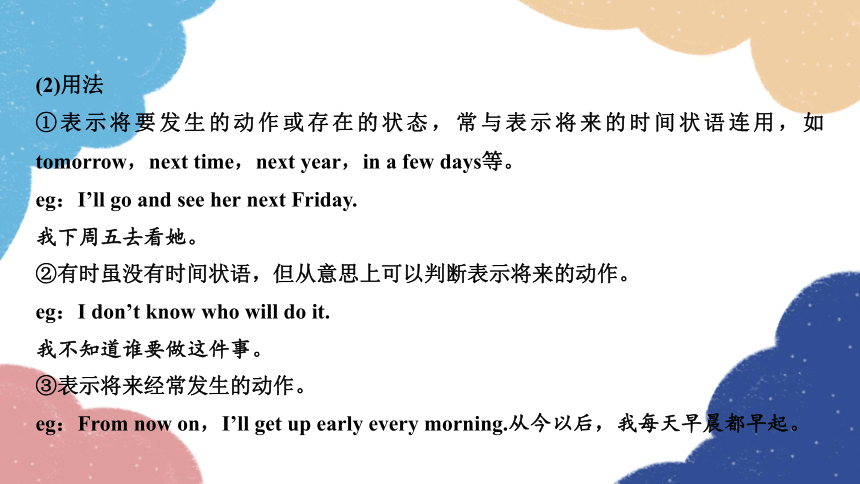
文档简介
(共46张PPT)
第九课时 动词的时态和语态
第二章
考点突破
考点1 动词的时态
动词有人称和数的变化,一般来说,谓语动词的人称和数的变化要与主语保持一致。同时,动词的不同变化还代表了时态或语态的不同。动词的时态分为一般现在时、一般过去时、一般将来时、现在进行时、现在完成时、过去进行时、过去完成时、过去将来时等。
1.一般现在时
(1)构成
在一般现在时的句子中,除主语为第三人称单数以外,谓语动词一律用原形;若主语为第三人称单数,则谓语动词也应用其第三人称单数形式。
动词第三人称单数形式的变化规则:一般在动词原形后直接加-s;以ch,sh,s,o,x结尾的动词后加-es;以“辅音字母+y”结尾的动词,先将y变为i,再加-es;以“元音字母+y”结尾的动词后加-s。另外,be动词和have有特殊的人称变化形式。
eg:I have a pen.He has a pen,too.
我有一支钢笔。他也有一支钢笔。
(2)用法
①表示经常发生的动作、行为或存在的状态。常用的时间状语有often,usually,always,every day等。
eg:I go to school every day except weekends.
除了周末,我每天都上学。
②表示主语的身份或特征。
eg:His father is a doctor.
他父亲是一名医生。
③表示一种客观事实或普遍真理。
eg:The moon goes around the earth.
月球绕着地球转。
④在条件状语从句和时间状语从句中,用一般现在时表示将来。
eg:If you don’t go soon,you’ll be late.
如果你不快去的话,你就要迟到了。
( B )①(2018·安顺)—The weather report says that it tomorrow in most parts of Anshun City.
—If it ,the school sports meet will be canceled.
A.will rain;will rain
B.will rain;rains
C.rains;will rain
D.rains;rains
B
( C )②(2020·上海)Every year thousands of tourists the mountain area to relax themselves.
A.visited B.were visiting
C.visit D.have visited
C
2.一般过去时
(1)构成
在一般过去时的句子中,谓语动词使用动词过去式。
过去式与过去分词的变化规则:一般在动词原形后加-ed;以e结尾的动词,在词尾加-d;以重读闭音节结尾的动词,末尾只有一个辅音字母,双写这个辅音字母,再加-ed;以“辅音字母+y”结尾的动词,先将y变为i,再加-ed;不规则动词的过去式与过去分词则要根据不规则动词表逐一记忆。
(2)用法
①表示在过去某一时间内发生的动作或存在的状态,常与表示过去的时间状语连用,如yesterday,last week,an hour ago,just now,once upon a time,in 1989,in the old days等。
eg:He left for Beijing yesterday morning.
他昨天上午出发去了北京。
②表示过去经常或反复发生的动作。
eg:I got up very early at that time.
我那时起床很早。
( B )①—Where did you go last weekend?
—I to the Great Wall.
A.go B.went
C.will go D.have gone
B
( D )②—Sorry,Tom.I can’t find the book you me.
—It’s OK.I don’t need it any more.
A.lend B.have lent
C.will lend D.lent
D
3.一般将来时
(1)构成
一般将来时由“助动词shall/will+动词原形”构成。在疑问句及书面语中,主语为第一人称(I和we)时,常用助动词shall。在口语中,所有人称都可以用will。will常缩写成 “‘ll”,will not缩写成won’t,shall not缩写成shan’t。“be going to+动词原形”也可以表示将要发生的动作或安排,或打算、计划要做的事。
(2)用法
①表示将要发生的动作或存在的状态,常与表示将来的时间状语连用,如tomorrow,next time,next year,in a few days等。
eg:I’ll go and see her next Friday.
我下周五去看她。
②有时虽没有时间状语,但从意思上可以判断表示将来的动作。
eg:I don’t know who will do it.
我不知道谁要做这件事。
③表示将来经常发生的动作。
eg:From now on,I’ll get up early every morning.从今以后,我每天早晨都早起。
( D )①We’ll have to clean the plates before our mother home.
A.will come B.is coming
C.come D.comes
D
( A )②I you as soon as I get to the airport.
A.will call B.call
C.is calling D.called
A
4.现在进行时
(1)构成
现在进行时由“be动词+动词的现在分词”构成。
动词现在分词的变化规则:一般在动词原形后直接加-ing;以不发音的e结尾的动词,去掉e,再加-ing;以重读闭音节结尾且末尾只有一个辅音字母的动词,先双写结尾的辅音字母,再加-ing;少数几个以ie结尾的动词,要变ie为y,再加-ing。
(2)用法
①表示说话时谓语的动作正在进行。
eg:Who are you waiting for?你在等谁?
②在现阶段正在进行的动作,但不一定说话时动作正在进行。
eg:The students are working on the farm these days.这些天学生们在农场劳动。
③有些动词的-ing形式还可用来表示将来时。这类动词有go,come,leave,arrive,move,die等。
eg:He is coming soon.他不久就要来了。
( B )①The world .Things never stay the same.
A.changes B.is changing
C.was changing D.will change
B
( C )②—What’s your brother doing?
—He a kite.
A.makes B.made
C.is making D.will make
5.现在完成时
(1)构成
现在完成时由“have/has+动词的过去分词”构成。在用already,yet,just,ever,never等副词作状语,由for,since引起的短语作状语,或者since引起的句子作状语从句时,句子的谓语动词常用现在完成时。
C
(2)用法
①表示过去某一时间发生的动作或存在的状态对现在仍有影响。
eg:—Have you had your lunch yet?
你吃午饭了吗?
—Yes,I have.I’ve just had it.
是的,我刚吃了。
②表示从过去某一时间开始一直持续到现在的动作或状态。
eg:We’ve known each other since we were children.我们从小就认识。
【辨析】have/has been to与have/has gone to
词条 用法
have/has been to 后面加地点,表示“去过某地”,说话时已经回来了。
have/has gone to 后面加地点,表示“去某地了”,说话时还没有回来。
eg:He has been to Beijing three times.
他去过北京三次了。
He has gone to Shanghai.他去上海了。
( A )①I don’t think I you in that dressbefore.
A.haveseen B.was seeing
C.saw D.see
A
( D )②—Where’s Mr.Zhang?
—He London.
A.has been to B.has been
C.has gone D.has gone to
D
6.过去进行时
(1)构成
过去进行时由“was/were+动词-ing形式”构成。
(2)用法
过去进行时主要表示过去某个时刻或某一段时间正在进行的动作。过去进行时常与表示过去的时间状语(then,at that time,at seven yesterday等)连用。
eg:I was writing a letter at home at seven yesterday evening.
昨晚七点我正在家写信。
( C )①I my homework while my parents were cooking last night.
A.did B.is doing
C.was doing D.have done
C
( D )②We an English class at this time
yesterday.
A.had B.have
C.are having D.were having
7.过去完成时
(1)构成
过去完成时由“助动词had(用于各种人称和数)+动词的过去分词”构成。
D
(2)用法
过去完成时表示过去某一时间或动作以前已经发生或完成了的动作,即过去的过去。在包含when,as soon as,before,after,until等连词的复合句中,若主句谓语和从句谓语所表示的过去的动作是在不同时间发生的,那么,先发生的动作用过去完成时,后发生的动作用一般过去时;如果主句动作和从句动作紧接着发生,特别是连词为 after或before时,由于连词本身很清楚地表明了动作发生的先后顺序,两个动作此时都可使用一般过去时。
eg:The plane had taken off when I got to theairport.
当我到达机场时,飞机已经起飞了。
I told them after you left.
你走后我就告诉了他们。
( C )①By the time Mary got up,Tim had already into the bathroom.
A.went B.has gone
C.gone D.goes
C
( D )②—Did you see Mr.Chen yesterday?
—No.When I got to school,he already.
A.left B.has left
C.was leaving D.had left
D
8.过去将来时
(1)构成
过去将来时由“助动词should/would+动词原形”构成。第一人称用should,其他人称用would。但目前在英美等国家也有第一人称用would的情况。过去将来时也可由“was/weregoing to+动词原形”构成。
eg:She said she was going to see her uncle.
她说她要去看望她的叔叔。
(2)用法
①过去将来时是个相对的时态,主要用于表示从过去某一时间来看将要发生的事情,常用在宾语从句中,表示从句的动作发生在主句动作之后。
eg:They said they would go to visit the second factory.
他们说他们要去参观第二家工厂。
②有些动词的过去进行时也可表示过去将来时。这一用法与某些动词的现在进行时表示一般将来时的用法相同。
eg:I didn’t have much time to talk with you because I was leaving for Shanghai in two hours.我没有多少时间跟你谈话,因为再过两个小时我就要动身去上海了。
( B )①Tom said he back in a week.
A.will come B.would come
C.come D.came
B
( D )②His uncle said that a good harvest the next year.
A.there is B.there will be
C.there was D.there would be
D
考点2 动词的语态
语态是动词的一种形式,用以表示主语和谓语之间的关系。英语的语态分为主动语态和被动语态。主动语态表示主语是动作的执行者或发出者,被动语态表示主语是动作的承受者或接受者。
1.被动语态由“助动词be+及物动词的过去分词”构成。变主动为被动或变被动为主动时,把原句的主语和宾语互换。
eg:We grew a tree yesterday.→A tree was grown by us yesterday.
我们昨天种了一棵树。
( B )①She dancing at this time yesterday.
A.see B.was seen
C.saw D.seen
B
( B )②—Which sport are you in at the school sports meeting?
—No decision yet.I think it after discussing with my P.E.teacher.
A.will decide B.will be decided
C.is decided D.was decided
B
2.在不同的时态中,过去分词保持不变,而助动词be随着时态的变化而变化,如am/is/are(一般现在时),was/were(一般过去时),have/has been(现在完成时),am/is/are doing(现在进行时)等。若含有情态动词,则用“情态动词+be+及物动词的过去分词”结构。
eg:The flowers are being watered by them.
他们正在浇花。
( C )①How long may this book by Honghong?
A.be keeping B.kept
C.be kept D.is kept
C
( B )②The People’s Republic of China on October 1,1949.
A.found B.was founded
C.is founded D.was found
3.句中含有双宾语(如give/buy sb.sth.)时,一般要把间接宾语(sb.)变成被动句的主语,若将直接宾语(sth.)变成主语,则在间接宾语前加上介词to或for。常用介词to的动词有give,show,pass,bring,hand,lend,send等;常用介词for 的动词有buy,make等。
eg:The eraser was passed to me at last.
最后,橡皮被递给了我。
B
( C )①A beautiful picture us by our English teacher last week.
A.is shown B.is shown to
C.was shown to D.showed to
C
( A )②A dictionary my classmate by me yesterday.
A.was lent to B.is lent to
C.is lent D.was lent
4.主动句中,谓语是含有介词或副词的动词短语,变为被动句时,介词或副词不能省略。常见的词组有listen to,take care of,pay attention to等。
eg:We are looking for a book about Asia.→
A book about Asia is being looked for by us.我们正在找一本关于亚洲的书。
A
( D )①This dictionary mustn’t from the library.
A.take away B.taken away
C.be taken D.be taken away
D
( D )②Parents must be by us when they are old.
A.take care B.take care of
C.taken care D.taken care of
5.主动句中作宾补的不带to的动词不定式,变为被动句时,要加上to。常见的词组有hear/see sb.do sth.,make sb.do sth.等。
eg:We make the boy feel at home.→The boy is made to feel at home by us.
我们让这个男孩感到宾至如归。
D
( D )①The man for more than ten hours a day.
A.made to work
B.was made working
C.was made work
D.was made to work
D
( B )②Kate likes singing and sometimes she by the neighbors.
A.heard to sing
B.is heard to sing
C.was heard singing
D.was heard to sing
B
备考演练
一、词汇运用或完成句子
1.(2022·定西二模)When the Chinese athlete was presented (present) with a gold medal,she couldn’t help crying.
2.(2022·兰州一诊)The new discoveries in Sanxingdui Ruin Site have helped (help) people better understand the history of China so far.
3.(2022·兰州一诊)—Why didn’t you answer my phone at 10 o’clock yesterday morning?
—Oh,I was having (have) my Chinese class online.
4.(2021·兰州B卷)Aunt Li asked (ask) me to help her feed the chickens last week.
was presented
have helped
was having
asked
5.(2021·兰州B卷)Some children are playing (play) soccer on the playground now.
6.(2021·兰州B卷)Should teenagers be allowed (allow) to choose their own clothes?
7.(2020·武威)A new big park will be built (build) in our city next year.
8.(2019·甘肃)Smoking isn’t allowed (not allow) in public.
9.(2022·庆阳模拟)She translated the novel into English.(改为被动语态)
The novel was translated into English by her.
playing
allowed
will be built
isn’t allowed
was
translated
10.(2022·甘肃)Linda helps her mom with housework every day.(用at 10 o’clockyesterday morning 替换时间状语,改写句子)
Linda was helping her mom with houseworkat 10 o’clock yesterday morning.
was
helping
二、单项选择
( C )1.(2020·兰州)—How long you chemistry so far?
—For almost one year.
A.are;studying B.do;study
C.have;studied D.will;study
( C )2.(2022·天水麦积区模拟)When I got to the cinema,the movie for ten minutes.
A.has been over B.has stopped
C.had been on D.had begun
C
C
( A )3.(2022·黔东南州)—Where’s Mr.Yang?
—He Longquan Mountain in Danzhai.He there three times because he enjoys the local scenery.
A.has gone to;hasbeen
B.has gone to;has gone to
C.has been to;has gone
D.has been to;has been to
A
( C )4.(2022·铜仁)—Your son’s dream will come true as long as .
—I hope so.
A.he will study hard
B.she will study hard
C.he studies hard
D.she studies hard
( A )5.(2022·黄冈)—Hello!May I speak to Kate?
—Sorry,she isn’t in.She ping-pong outside.
A.isplaying B.plays
C.played D.will play
C
A
( B )6.(2022·鄂州)—The Law on Family Education Promotion(《家庭教育促进法》) on Oct.23,2021.
—Yeah!It came into effect(生效) on Jan.1,2022.
A.passes B.was passed
C.passed D.pass
B
( B )7.(2022·武威模拟)—Did you have a good sleep last night?
—No.My neighbor the guitar the whole night.
A.plays B.was playing
C.is playing D.would play
( B )8.(2019·金昌)A baby’s first month birthday is a special event in China and with a special party.
A.celebrates B.is celebrated
C.was celebrated D.will celebrate
B
B
( C )9.(2022·哈尔滨)Wang Yaping,the female(女性的) Chinese spacewalker, her first spacewalk in November,2021.
A.has begun B.begins
C.began
C
( C ) 10.(2021·定西)Which of the following is RIGHT?
A.He is used to live there.
B.She is listening to music at 8 o’clock
last night.
C.I have borrowed the book from the
library for two weeks.
D.Kids under 18 are not allowed to drive.
( A )11.(原创)We’re not sure if it tomorrow.If it ,we won’t climb the Hannah mountain.
A.will rain;rains B.will rain;will rain
C.rains;rains D.rains;rain
A
D
第九课时 动词的时态和语态
第二章
考点突破
考点1 动词的时态
动词有人称和数的变化,一般来说,谓语动词的人称和数的变化要与主语保持一致。同时,动词的不同变化还代表了时态或语态的不同。动词的时态分为一般现在时、一般过去时、一般将来时、现在进行时、现在完成时、过去进行时、过去完成时、过去将来时等。
1.一般现在时
(1)构成
在一般现在时的句子中,除主语为第三人称单数以外,谓语动词一律用原形;若主语为第三人称单数,则谓语动词也应用其第三人称单数形式。
动词第三人称单数形式的变化规则:一般在动词原形后直接加-s;以ch,sh,s,o,x结尾的动词后加-es;以“辅音字母+y”结尾的动词,先将y变为i,再加-es;以“元音字母+y”结尾的动词后加-s。另外,be动词和have有特殊的人称变化形式。
eg:I have a pen.He has a pen,too.
我有一支钢笔。他也有一支钢笔。
(2)用法
①表示经常发生的动作、行为或存在的状态。常用的时间状语有often,usually,always,every day等。
eg:I go to school every day except weekends.
除了周末,我每天都上学。
②表示主语的身份或特征。
eg:His father is a doctor.
他父亲是一名医生。
③表示一种客观事实或普遍真理。
eg:The moon goes around the earth.
月球绕着地球转。
④在条件状语从句和时间状语从句中,用一般现在时表示将来。
eg:If you don’t go soon,you’ll be late.
如果你不快去的话,你就要迟到了。
( B )①(2018·安顺)—The weather report says that it tomorrow in most parts of Anshun City.
—If it ,the school sports meet will be canceled.
A.will rain;will rain
B.will rain;rains
C.rains;will rain
D.rains;rains
B
( C )②(2020·上海)Every year thousands of tourists the mountain area to relax themselves.
A.visited B.were visiting
C.visit D.have visited
C
2.一般过去时
(1)构成
在一般过去时的句子中,谓语动词使用动词过去式。
过去式与过去分词的变化规则:一般在动词原形后加-ed;以e结尾的动词,在词尾加-d;以重读闭音节结尾的动词,末尾只有一个辅音字母,双写这个辅音字母,再加-ed;以“辅音字母+y”结尾的动词,先将y变为i,再加-ed;不规则动词的过去式与过去分词则要根据不规则动词表逐一记忆。
(2)用法
①表示在过去某一时间内发生的动作或存在的状态,常与表示过去的时间状语连用,如yesterday,last week,an hour ago,just now,once upon a time,in 1989,in the old days等。
eg:He left for Beijing yesterday morning.
他昨天上午出发去了北京。
②表示过去经常或反复发生的动作。
eg:I got up very early at that time.
我那时起床很早。
( B )①—Where did you go last weekend?
—I to the Great Wall.
A.go B.went
C.will go D.have gone
B
( D )②—Sorry,Tom.I can’t find the book you me.
—It’s OK.I don’t need it any more.
A.lend B.have lent
C.will lend D.lent
D
3.一般将来时
(1)构成
一般将来时由“助动词shall/will+动词原形”构成。在疑问句及书面语中,主语为第一人称(I和we)时,常用助动词shall。在口语中,所有人称都可以用will。will常缩写成 “‘ll”,will not缩写成won’t,shall not缩写成shan’t。“be going to+动词原形”也可以表示将要发生的动作或安排,或打算、计划要做的事。
(2)用法
①表示将要发生的动作或存在的状态,常与表示将来的时间状语连用,如tomorrow,next time,next year,in a few days等。
eg:I’ll go and see her next Friday.
我下周五去看她。
②有时虽没有时间状语,但从意思上可以判断表示将来的动作。
eg:I don’t know who will do it.
我不知道谁要做这件事。
③表示将来经常发生的动作。
eg:From now on,I’ll get up early every morning.从今以后,我每天早晨都早起。
( D )①We’ll have to clean the plates before our mother home.
A.will come B.is coming
C.come D.comes
D
( A )②I you as soon as I get to the airport.
A.will call B.call
C.is calling D.called
A
4.现在进行时
(1)构成
现在进行时由“be动词+动词的现在分词”构成。
动词现在分词的变化规则:一般在动词原形后直接加-ing;以不发音的e结尾的动词,去掉e,再加-ing;以重读闭音节结尾且末尾只有一个辅音字母的动词,先双写结尾的辅音字母,再加-ing;少数几个以ie结尾的动词,要变ie为y,再加-ing。
(2)用法
①表示说话时谓语的动作正在进行。
eg:Who are you waiting for?你在等谁?
②在现阶段正在进行的动作,但不一定说话时动作正在进行。
eg:The students are working on the farm these days.这些天学生们在农场劳动。
③有些动词的-ing形式还可用来表示将来时。这类动词有go,come,leave,arrive,move,die等。
eg:He is coming soon.他不久就要来了。
( B )①The world .Things never stay the same.
A.changes B.is changing
C.was changing D.will change
B
( C )②—What’s your brother doing?
—He a kite.
A.makes B.made
C.is making D.will make
5.现在完成时
(1)构成
现在完成时由“have/has+动词的过去分词”构成。在用already,yet,just,ever,never等副词作状语,由for,since引起的短语作状语,或者since引起的句子作状语从句时,句子的谓语动词常用现在完成时。
C
(2)用法
①表示过去某一时间发生的动作或存在的状态对现在仍有影响。
eg:—Have you had your lunch yet?
你吃午饭了吗?
—Yes,I have.I’ve just had it.
是的,我刚吃了。
②表示从过去某一时间开始一直持续到现在的动作或状态。
eg:We’ve known each other since we were children.我们从小就认识。
【辨析】have/has been to与have/has gone to
词条 用法
have/has been to 后面加地点,表示“去过某地”,说话时已经回来了。
have/has gone to 后面加地点,表示“去某地了”,说话时还没有回来。
eg:He has been to Beijing three times.
他去过北京三次了。
He has gone to Shanghai.他去上海了。
( A )①I don’t think I you in that dressbefore.
A.haveseen B.was seeing
C.saw D.see
A
( D )②—Where’s Mr.Zhang?
—He London.
A.has been to B.has been
C.has gone D.has gone to
D
6.过去进行时
(1)构成
过去进行时由“was/were+动词-ing形式”构成。
(2)用法
过去进行时主要表示过去某个时刻或某一段时间正在进行的动作。过去进行时常与表示过去的时间状语(then,at that time,at seven yesterday等)连用。
eg:I was writing a letter at home at seven yesterday evening.
昨晚七点我正在家写信。
( C )①I my homework while my parents were cooking last night.
A.did B.is doing
C.was doing D.have done
C
( D )②We an English class at this time
yesterday.
A.had B.have
C.are having D.were having
7.过去完成时
(1)构成
过去完成时由“助动词had(用于各种人称和数)+动词的过去分词”构成。
D
(2)用法
过去完成时表示过去某一时间或动作以前已经发生或完成了的动作,即过去的过去。在包含when,as soon as,before,after,until等连词的复合句中,若主句谓语和从句谓语所表示的过去的动作是在不同时间发生的,那么,先发生的动作用过去完成时,后发生的动作用一般过去时;如果主句动作和从句动作紧接着发生,特别是连词为 after或before时,由于连词本身很清楚地表明了动作发生的先后顺序,两个动作此时都可使用一般过去时。
eg:The plane had taken off when I got to theairport.
当我到达机场时,飞机已经起飞了。
I told them after you left.
你走后我就告诉了他们。
( C )①By the time Mary got up,Tim had already into the bathroom.
A.went B.has gone
C.gone D.goes
C
( D )②—Did you see Mr.Chen yesterday?
—No.When I got to school,he already.
A.left B.has left
C.was leaving D.had left
D
8.过去将来时
(1)构成
过去将来时由“助动词should/would+动词原形”构成。第一人称用should,其他人称用would。但目前在英美等国家也有第一人称用would的情况。过去将来时也可由“was/weregoing to+动词原形”构成。
eg:She said she was going to see her uncle.
她说她要去看望她的叔叔。
(2)用法
①过去将来时是个相对的时态,主要用于表示从过去某一时间来看将要发生的事情,常用在宾语从句中,表示从句的动作发生在主句动作之后。
eg:They said they would go to visit the second factory.
他们说他们要去参观第二家工厂。
②有些动词的过去进行时也可表示过去将来时。这一用法与某些动词的现在进行时表示一般将来时的用法相同。
eg:I didn’t have much time to talk with you because I was leaving for Shanghai in two hours.我没有多少时间跟你谈话,因为再过两个小时我就要动身去上海了。
( B )①Tom said he back in a week.
A.will come B.would come
C.come D.came
B
( D )②His uncle said that a good harvest the next year.
A.there is B.there will be
C.there was D.there would be
D
考点2 动词的语态
语态是动词的一种形式,用以表示主语和谓语之间的关系。英语的语态分为主动语态和被动语态。主动语态表示主语是动作的执行者或发出者,被动语态表示主语是动作的承受者或接受者。
1.被动语态由“助动词be+及物动词的过去分词”构成。变主动为被动或变被动为主动时,把原句的主语和宾语互换。
eg:We grew a tree yesterday.→A tree was grown by us yesterday.
我们昨天种了一棵树。
( B )①She dancing at this time yesterday.
A.see B.was seen
C.saw D.seen
B
( B )②—Which sport are you in at the school sports meeting?
—No decision yet.I think it after discussing with my P.E.teacher.
A.will decide B.will be decided
C.is decided D.was decided
B
2.在不同的时态中,过去分词保持不变,而助动词be随着时态的变化而变化,如am/is/are(一般现在时),was/were(一般过去时),have/has been(现在完成时),am/is/are doing(现在进行时)等。若含有情态动词,则用“情态动词+be+及物动词的过去分词”结构。
eg:The flowers are being watered by them.
他们正在浇花。
( C )①How long may this book by Honghong?
A.be keeping B.kept
C.be kept D.is kept
C
( B )②The People’s Republic of China on October 1,1949.
A.found B.was founded
C.is founded D.was found
3.句中含有双宾语(如give/buy sb.sth.)时,一般要把间接宾语(sb.)变成被动句的主语,若将直接宾语(sth.)变成主语,则在间接宾语前加上介词to或for。常用介词to的动词有give,show,pass,bring,hand,lend,send等;常用介词for 的动词有buy,make等。
eg:The eraser was passed to me at last.
最后,橡皮被递给了我。
B
( C )①A beautiful picture us by our English teacher last week.
A.is shown B.is shown to
C.was shown to D.showed to
C
( A )②A dictionary my classmate by me yesterday.
A.was lent to B.is lent to
C.is lent D.was lent
4.主动句中,谓语是含有介词或副词的动词短语,变为被动句时,介词或副词不能省略。常见的词组有listen to,take care of,pay attention to等。
eg:We are looking for a book about Asia.→
A book about Asia is being looked for by us.我们正在找一本关于亚洲的书。
A
( D )①This dictionary mustn’t from the library.
A.take away B.taken away
C.be taken D.be taken away
D
( D )②Parents must be by us when they are old.
A.take care B.take care of
C.taken care D.taken care of
5.主动句中作宾补的不带to的动词不定式,变为被动句时,要加上to。常见的词组有hear/see sb.do sth.,make sb.do sth.等。
eg:We make the boy feel at home.→The boy is made to feel at home by us.
我们让这个男孩感到宾至如归。
D
( D )①The man for more than ten hours a day.
A.made to work
B.was made working
C.was made work
D.was made to work
D
( B )②Kate likes singing and sometimes she by the neighbors.
A.heard to sing
B.is heard to sing
C.was heard singing
D.was heard to sing
B
备考演练
一、词汇运用或完成句子
1.(2022·定西二模)When the Chinese athlete was presented (present) with a gold medal,she couldn’t help crying.
2.(2022·兰州一诊)The new discoveries in Sanxingdui Ruin Site have helped (help) people better understand the history of China so far.
3.(2022·兰州一诊)—Why didn’t you answer my phone at 10 o’clock yesterday morning?
—Oh,I was having (have) my Chinese class online.
4.(2021·兰州B卷)Aunt Li asked (ask) me to help her feed the chickens last week.
was presented
have helped
was having
asked
5.(2021·兰州B卷)Some children are playing (play) soccer on the playground now.
6.(2021·兰州B卷)Should teenagers be allowed (allow) to choose their own clothes?
7.(2020·武威)A new big park will be built (build) in our city next year.
8.(2019·甘肃)Smoking isn’t allowed (not allow) in public.
9.(2022·庆阳模拟)She translated the novel into English.(改为被动语态)
The novel was translated into English by her.
playing
allowed
will be built
isn’t allowed
was
translated
10.(2022·甘肃)Linda helps her mom with housework every day.(用at 10 o’clockyesterday morning 替换时间状语,改写句子)
Linda was helping her mom with houseworkat 10 o’clock yesterday morning.
was
helping
二、单项选择
( C )1.(2020·兰州)—How long you chemistry so far?
—For almost one year.
A.are;studying B.do;study
C.have;studied D.will;study
( C )2.(2022·天水麦积区模拟)When I got to the cinema,the movie for ten minutes.
A.has been over B.has stopped
C.had been on D.had begun
C
C
( A )3.(2022·黔东南州)—Where’s Mr.Yang?
—He Longquan Mountain in Danzhai.He there three times because he enjoys the local scenery.
A.has gone to;hasbeen
B.has gone to;has gone to
C.has been to;has gone
D.has been to;has been to
A
( C )4.(2022·铜仁)—Your son’s dream will come true as long as .
—I hope so.
A.he will study hard
B.she will study hard
C.he studies hard
D.she studies hard
( A )5.(2022·黄冈)—Hello!May I speak to Kate?
—Sorry,she isn’t in.She ping-pong outside.
A.isplaying B.plays
C.played D.will play
C
A
( B )6.(2022·鄂州)—The Law on Family Education Promotion(《家庭教育促进法》) on Oct.23,2021.
—Yeah!It came into effect(生效) on Jan.1,2022.
A.passes B.was passed
C.passed D.pass
B
( B )7.(2022·武威模拟)—Did you have a good sleep last night?
—No.My neighbor the guitar the whole night.
A.plays B.was playing
C.is playing D.would play
( B )8.(2019·金昌)A baby’s first month birthday is a special event in China and with a special party.
A.celebrates B.is celebrated
C.was celebrated D.will celebrate
B
B
( C )9.(2022·哈尔滨)Wang Yaping,the female(女性的) Chinese spacewalker, her first spacewalk in November,2021.
A.has begun B.begins
C.began
C
( C ) 10.(2021·定西)Which of the following is RIGHT?
A.He is used to live there.
B.She is listening to music at 8 o’clock
last night.
C.I have borrowed the book from the
library for two weeks.
D.Kids under 18 are not allowed to drive.
( A )11.(原创)We’re not sure if it tomorrow.If it ,we won’t climb the Hannah mountain.
A.will rain;rains B.will rain;will rain
C.rains;rains D.rains;rain
A
D
同课章节目录
- 词法
- 名词
- 动词和动词短语
- 动词语态
- 动词时态
- 助动词和情态动词
- 非谓语动词
- 冠词
- 代词
- 数词和量词
- 形容词副词及其比较等级
- 介词和介词短语
- 连词和感叹词
- 构词法
- 相似、相近词比较
- 句法
- 陈述句
- 一般疑问句和否定疑问句
- 特殊疑问句及选择疑问句
- 反意疑问句
- 存在句(There be句型)
- 宾语从句
- 定语从句
- 状语从句
- 主谓一致问题
- 简单句
- 并列句
- 复合句
- 主谓一致
- 主、表语从句
- 名词性从句
- 直接引语和间接引语
- 虚拟语气
- 感叹句
- 强调句
- 倒装句
- 祈使句
- 句子的成分
- 句子的分类
- 题型专区
- 单项选择部分
- 易错题
- 完形填空
- 阅读理解
- 词汇练习
- 听说训练
- 句型转换
- 补全对话
- 短文改错
- 翻译
- 书面表达
- 任务型阅读
- 语法填空
- 其他资料
